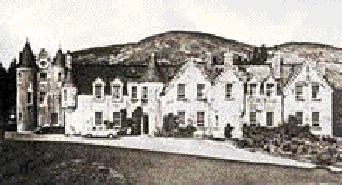 Charles Hills MacKintosh M.D. M.R.C.S. L.R.C.P. L.S.A. (14 February 1808 – 13 March 1893) 10th Laird of Dalmunzie, was a British orthodox physician who converted to homeopathy to become Physician at the Torquay Homeopathic Dispensary, a Member of the Medical Committee of the British Homeopathic Association, Member of the British Homeopathic Society, Member of the Hahnemann Publishing Society, and a Sponsor of the Hahnemann Monument at Köthen, Germany. Mackintosh was also on the local Torquay committees for the R.S.P.C.A. and Anti-Vivisection Society.
Charles Hills MacKintosh M.D. M.R.C.S. L.R.C.P. L.S.A. (14 February 1808 – 13 March 1893) 10th Laird of Dalmunzie, was a British orthodox physician who converted to homeopathy to become Physician at the Torquay Homeopathic Dispensary, a Member of the Medical Committee of the British Homeopathic Association, Member of the British Homeopathic Society, Member of the Hahnemann Publishing Society, and a Sponsor of the Hahnemann Monument at Köthen, Germany. Mackintosh was also on the local Torquay committees for the R.S.P.C.A. and Anti-Vivisection Society.
Charles Hills MacKintosh practiced at 3 Higher Terrace, Torquay, and later at Morden Hall, Warren Road, Torquay.
Charles Hills MacKintosh was born in Colchester, Essex, on 14 February 1808, to Dr. Richard Duncan MacKintosh (c. 1775 – 1862) and Cecelia Susanna Hills (c. 1777 – 1853). Richard MacKintosh also converted to homeopathy, and is listed in The British and Foreign Homoeopathic Medical Directory and Record, 1853, as practicing in Liverpool.
C. H. Mackintosh followed his father into the medical profession, training at the Westminster Hospital. In 1829, he was admitted as a licentiate of the Society of Apothecaries, and the following year, 1830, was elected a member of the Royal College of Surgeons.
Mackintosh took up as an orthodox practitioner in Exeter, until 1841. That year he gave up private practice and, after being granted a diploma extra urbem from the Royal College of Physicians, began studying homeopathy.
C. H. Mackintosh moved to Torquay where he established a new practice as an homeopathic physician and was acknowledged as an expert on the materia medica. In 1849, a major cholera outbreak ravaged the town, causing dozens of deaths. Mackintosh treated his patients homeopathically according to Hahnemann‘s instructions and during the peak months of September and October 1849, only lost four out of more than forty cases.
Mackintosh’s cholera results were cited in Alfred Crosby Pope‘s 1861 book, The Homoeopathic System of Medicine; Its Theory and Results, with Mackintosh quoted as saying that “More than 200 cases of cholerine were treated, which yielded without difficulty to the usual remedies.”
In 1842, Charles Hills Mackintosh married Henrietta Vallack (1808 – 1886). They had three daughters, Ellen (Helen) Galloway, (1849 – 1931), Marion Murray (1850 -32), and Cecilia Eliza (1857 -1942 ).
Mackintosh’s practice grew across the region and with no homeopath then west of Bristol he was regarded as the pioneer of homeopathy in the “Far West.”
In 1863, Mackintosh obtained his M.D. from the University of St Andrews.
Four years later, in 1867, Mackintosh inherited the Scottish title of Laird of Dalmunzie, accompanied by a large estate in Scotland.
Charles Hills MacKintosh, b. 14 Feb. 1808, who became (owner) of (the) Dalmunzie (estate) in 1867, m. Henrietta, dau. of John Vallack, Kingsand, Cornwall, and d. 13 March 1893, leaving three daughters Helen Galloway, Marion Murray, and Cecilia Eliza. At his death the representation devolved on his nephew….
A larger L shaped lodge was built over this in 1884, a Victorian wing added in the 1890’s and the building and estate leased for shooting parties.
Hugh Richard Duncan MacKintosh, 11th Laird of Dalmunzie was the last MacKintosh, dying childless in London in 1916. It was over this period that the Gaelic language which had been in use for thousands of years in Glenshee finally disappeared.
Over three hundred and fifty years of ownership by the Mac(K)intoshes came to an end when Dalmunzie was purchased in 1920 by Sir Archibald Birkmyre who had leased the property as a shooting retreat since 1907.
In addition to his expansive and demanding private practice, for almost forty years Mackintosh also devoted his energies to the Torquay Homeopathic Dispensary. Regardless of rank, Mackintosh was a diligent and dedicated physician who was reputed to have almost never missed attending his regular days:
The claims of the wealthy were never allowed to interfere with the hours he had set apart for attention to the sick poor.
In 1883, Mackintosh retired, with Dr. Alfred Midgely Cash taking over his Torquay practice. His wife Henrietta died just three years later, in 1886.
Mackintosh fell sick with bronchitis on 8 March 1893. He was attended by Midgeley Cash, in conjunction with Dr.’s Samuel Henry Woodgates of Exeter and William Cash Reed of Plymouth but after a brief recovery died two weeks later on 13 March, aged 84.
Of interest:
Richard Duncan MacKintosh M.D. Edinburgh 1799, RCGP, (c. 1775 – 1862), father of Charles Hills MacKintosh, was a British orthodox physician who converted to homeopathy, a Member of the Royal College of Medicine Edinburgh, Member of the Royal Medical and Chirurgical Society London, Physician at Essex and Colchester Hospital, President of the Colchester Literary and Philosophical Society, Member of the Liverpool Literary and Philosophical Society.
Richard Duncan MacKintosh later practiced at 11 Dix Field, Exeter. He married Ms. Hills, daughter of Charles Hills in 1801, (Charles Hills M.D. was the owner of the Dalmunzie estate).


Hi, fascinating information. It was in fact Richard Duncan Mackintosh who married Miss Cecilia Susanna Hills in Colchester in 1801!